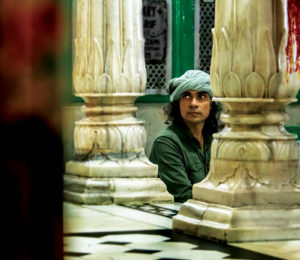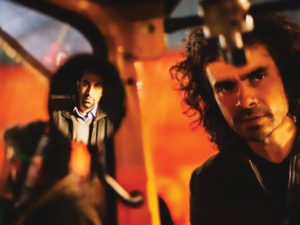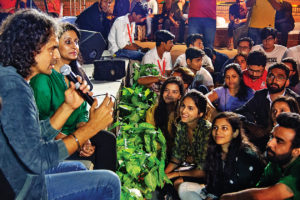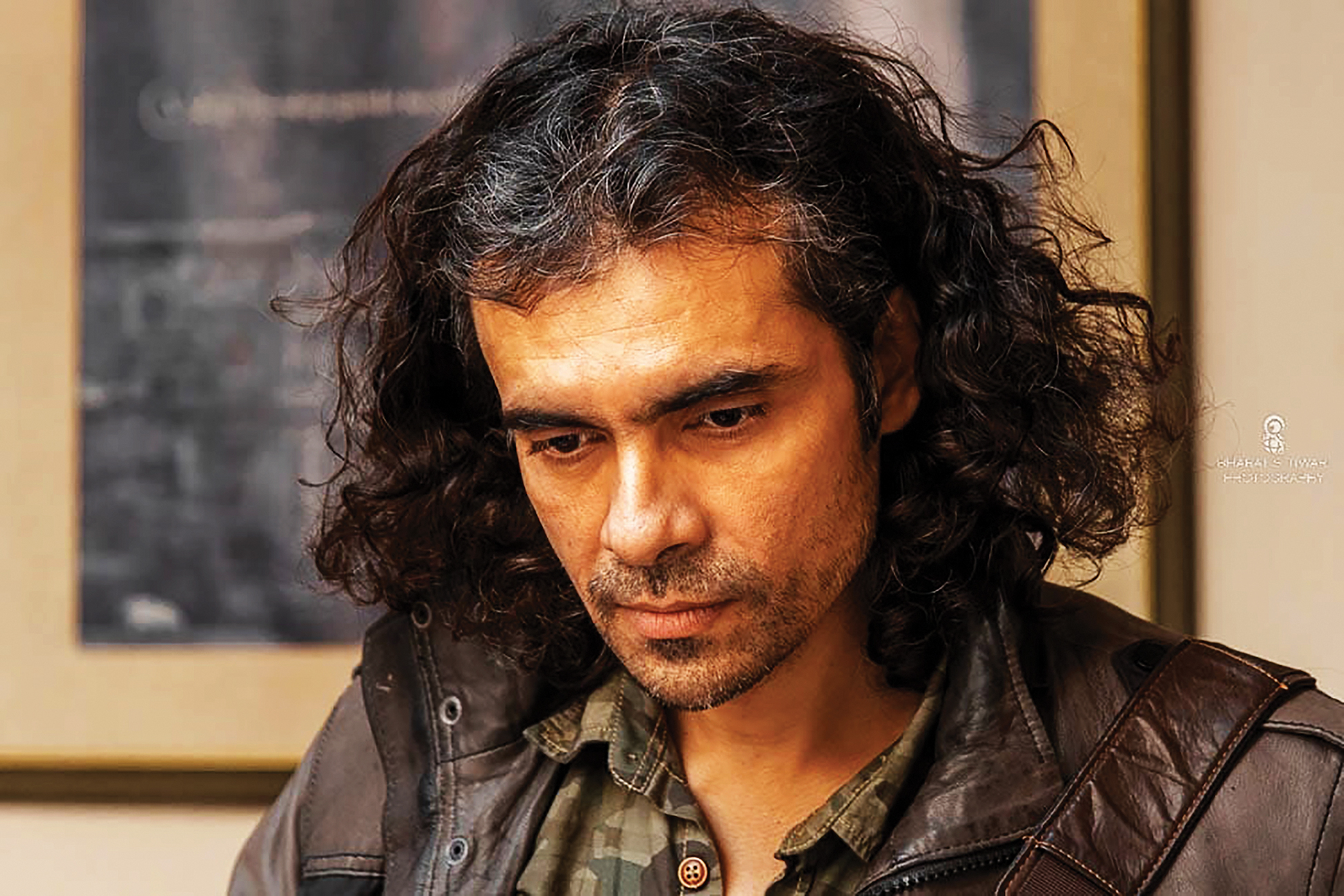In the second and last part of the interview with Imtiaz Ali, the filmmaker opens up about Hindi films, his peers in the film industry and his views on a host of things – from media, censorship, politics to web series. Excerpts:
What is your view on dance sequences in Hindi cinema?
I enjoy song and dance a lot in Hindi cinema but because my story lines are still believable, I also struggle a lot to try and include it in my films. If somebody suddenly starts dancing or singing, then it is a bit problematic. I can’t allow that to happen. Sometimes I plan it in the script and create a situation where some music is playing, like when somebody is a rockstar then ‘Woh toh gayega’ (he will obviously sing). Thus to create a dance sequence there is some sort of ploy that I work into the screenplay. For instance, in Tamasha, they (the protagonists) go to a fair, where a song is playing on the stage, and people are already dancing, singing. Thus they, along with the people, start dancing and then singing also. So I try to make it natural, believable.
I see a lot of intelligent youth getting attracted to Indian classical music and dance. As a movie maker, do you feel any responsibility towards portraying these in your films?
I don’t feel a responsibility towards it, but it’s a resource that I have and can borrow in order to make my own work better. So, if I can use some part of classical dance or music in my film, then I’m sure that it will make my film richer. In that way I have sometimes tried to borrow it, but not too many times. Nothing substantial has happened.
Why I am asking this is because I have seen when Rashid Khan Saab performs a song in your movie, the song becomes an icon. I have heard him sing in Shimla, IIT, among other places. So do you start feeling some responsibility towards it?
No, I don’t feel a responsibility. I think music is such a strong phenomenon. During Durga Puja, in my hometown or whichever town I would be in, I have had great exposure to classical music and dance. And even as a kid I was very much attracted to it because if you give it a chance, it’s the most profound experience that one can experience. And I wouldn’t know how to use it really well. I don’t feel a responsibility towards it, as I said, it is strong enough to survive and thrive on its own.
You have a real great connect with the youth, and it is much stronger than many other fimmakers. They look up to you. Have you ever thought of this as a responsibility?
Yes, in a way! Nobody smokes in any of my films. I think that at some age the youth gets very attracted to things like that. The other thing — since as a youth I liked the positivity shown in films — I aspire to show a reasonable atmosphere in my films, try to not to have twisted things, that might send wrong signals. People will be good and bad, like in life, but then I try to keep the tone of the film positive, even if it has a sad ending.
I feel the youth is always trying to reach somewhere, trying to look beyond. They are inquisitive, and interested in both internal and external. It is important to speak in non- hypocritical language, non-preachy language. I hate if somebody is being preachy, or fake.
Which is why, there is a certain believable language that I try to use in my films.
It’s only lucky for me — the only language that I can speak — connects with the youth.
I can’t talk in a hypocritical way.
I cannot be falsely dramatic.
I cannot be melodramatic… because I will make fun of it.
My friends will make fun of it.
My mother will make fun of it.
I cannot have false drama, false emotion, fake words.
I think this is why young people feel a sense of their own lives with my movies.

Good to know that you feel that responsibility towards them.
Yeah. It’s just that I feel I am like that. So I can’t fool anybody.
You’ve said Sunny Deol is your best friend, and that he is the most misunderstood.
Sunny is a senior actor, not my best friend. Unfortunately, we are not in touch anymore as we both are busy doing our own things. But he gave me my first break as a director as he was my first producer. He is the person responsible for me to be in this film industry. Sunny is an inhibited shy person, and people don’t know him, so he is misunderstood. He is the most unarrogant person that you’ll meet, a very decent human being.
What about Dharmendra?
Dharam Paaji is an extremely talented man. His talent is in acting, of course, and in telling stories. He is an extremely funny man, a very witty individual. He is very philosophical and he writes amazing human centric poetry in Urdu.
And Saif?
Saif is edgy, intelligent and very witty. He is a person who keeps no secrets. At his heart, I think, he is a schoolboy –very mercurial and sharp-witted.

Anurag Kashyap?
Anurag Kashyap is somebody whose mind is going in 20 directions, as he is involved with 20 things at the same time. Always nursing a calamity, as well as, a celebration. Anurag will always have interesting things to say but a little more than that is necessary. He will fight sometimes, because he enjoys it. He is very good at heart and has a unique voice of a very strong filmmaker.
You see an alter ego in him?
He and I have been friends for decades now. Always coming together at different times. Our behaviour, our movies are very dissimilar, but our understanding is very similar.
And Kirron Kher?
Kirron and I had the best time working together for Kurukshetra for television, that was really the first thing that I ever did. We had a great and successful time working together, contributing a lot to each other’s work life, at that point of time. Memories of that time are very fond.
What about girlfriend, marriage?
Girlfriend, shaadi! The less said the better. I don’t think I have anything to say on this.
What is politics for Imtiaz Ali?
Politics is a very risky word for me. Politics, in India, has a lot of connotations. I try to be as apolitical as possible. Since filmmakers and people in the film industry are popular, a lot of people ask them for their political opinions. I always tend to not comment on these things, just because I am a filmmaker, it doesn’t mean I know anything better than anybody else. Despite knowing this, if I comment, it’ll be carried (by media) more. So I desist from making any political comments or affiliations.
Is it tough to desist or has it become part of your nature?
It has become my nature. I believe that it is not my role in this world. My responsibility is to tell stories in the best way possible. That will hopefully give something positive to people. I don’t have to reach out to people through politics.
And media?
I’m a part of media. Media, in our lifetime, has undergone maximum change. It has a lot of variety now, in the types of people it has in it: agenda ridden, political in nature and so on. The one good thing I can say about media is the fact that no matter how much you criticise it but come to think of it: there can be no smoke without fire: the stories that go on in media cannot be completely untrue either.

Your views on the Censor Board?
My relationship with censorship is of love and hate. I, as a filmmaker, will always fight censorship because I am on the side of filmmakers, but whether we should decide about censorship or not, I don’t know. Though I feel that a lesser censorship is always better but at the same time, I see good movies coming out from places like Iran, where censorship is hundred times more severe than India.
What do you mean by this?
Censorship cannot be the only thing to destroy good cinema.
Can it not suppress a lot of things?
There is a great power to be discovered also by the filmmakers. But if censorship is unreasonable, redundant or behind the times, it is a little disturbing and then we put up a fight to try to update it.
What’s your take on web series?
It’s a very good development in the entertainment industry right now. A lot of feature films and stories that had duration problems and want to reach to a wider audience — will thrive over there. It will help flourish a certain type of writing and detailing of storytelling.
Are you watching any?
I watch some from time to time.
Any recommendations?
I have not watched too many but right now I’m watching a series called This is Us, before this I watched The Affair, Breaking Bad and Game of Thrones.
Have you seen Sacred Games?
I saw the first season. The second season I’ve not watched yet. I am very happy that it was so successful and opened the gate for other series.
What about Manoj Bajpai’s series The Family Man?
I’ve not seen it, but I’ve heard that it’s really very good.
How was your experience working with Shammi Kapoor and Ranbir Kapoor?
Haan! The first scene that they did together, Shammi-ji said “Ye bahot kameena actor hai” (He’s a brute of an actor) for Ranbir. This was a very big compliment for Ranbir.
Shammi-ji, I realised, as a human being had really transcended. He as an actor also had transcended and has become very simple to deal with. All the trappings had gone, he would understand and perform very easily — not caught in any old school of acting. Although he was one of the oldest actors I’ve worked with, but I must underline this, he was just like Ranbir to me, a modern, new actor trying to do his job in the best possible way, one thing that all actors will understand. He was a great man — always looking forward to new things, different things, new cars, new music, he was ahead of his times.
His taste in music was very intriguing. I remember once when I went to his house, he said, “You should listen to Nepali songs, I’m listening these days.” He was extremely musical oriented. I am blessed that I could work with him, as Rockstar turned out to be his last film.
And his grandnephew Ranbir? How is your relation with him?
Ranbir and I have done two films together. He is perhaps the best actor I’ve ever worked with. He is very interested in stories, films and acting. Ranbir is a true soldier of cinema!
World politics at the moment?
The whole world is going in a very consumerist way, which I really don’t like a lot. There is a high level of consumerism in the world — the divide between the rich and the poor is widening — a lot of important things, a lot of substances are getting ignored by rhetoric. Media is being taken over by the market. These things are not healthy for our world.
Scared?
I hope the trend reverses. Cut-throat consumerism and pushing products to people, making them more and more credit-oriented, should change. A proper value system should come into the market, where market is not like the stock market but is based on the true value of things.
Lastly, what does Delhi mean for Imtiaz Ali… and his favourite places in the city?
The most important place for me in Delhi is Delhi University. It’s the place where I have spent time and learnt a lot, met very interesting people, had interesting discussions. It was full of greenery and clean those days, unlike now.
Delhi and its people are very dramatic. They are ready to give their lives for you, then they are ready to take your life as well. The city has all kinds of people — brash, as well as sophisticated and cultured people.
The most important thing about the city is that it is the only metropolitan city where people speak Hindi and this practical reason — my movies are in Hindi — makes me keep returning to Delhi to make movies: to enjoy the language, to show a real city. It has various stages of history that you can see, at the same time there are old monuments that are present with the modern structure.
There are a lot of artistic people in Delhi the graffiti that you find in here, you don’t find in any other city of the country. It is the capital city that adds a certain splendour to parts of Delhi, Lutyens Delhi — a certain exuberance, rich planning, places like ghettos in the east of the city.
What about the place where we started today, Hazrat Nizamuddin Aulia…
I was lucky to get permission to shoot at Dargah of Hazrat Nizamuddin for Rockstar. It a great privilege to actually spend days and nights at the Dargah. Even today when I went there, I was thinking that what good have I done in my life that I am here. I feel a connection to this place. I was born in Jamshedpur, have lived my life in various cities but something makes me come here with such a sense of ownership. When I walk inside the Dargah, I feel like I am a part of this place.
It is strange that someone like me who has otherwise nothing to do with this place feels so much at home here.
So, I think when great people spend time in the service of others in any place, that place becomes special — in a lifestyle full of humility – and then it attracts certain good energies and that being present over there attracts people like you and me.
I feel that anybody who can go there and feel at home is blessed, particularly because of the presence of Ameer Khusro in Hazrat Nizamuddin, and he is so much a part of the place. And that was the place where I think qawwali began, khayaal began and these verses that he would sing to Hazrat, even now they are in the same position,
So to be amidst all that is a privilege and I always look forward to go there.





